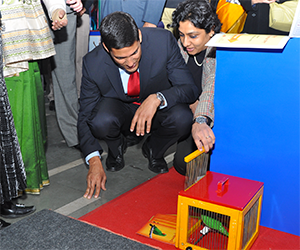On a recent trip to India, USAID Administrator Dr. Rajiv Shah met a horoscope-telling parrot who shared HIV messages. The meeting took place at the HIV/AIDS Innovations Exhibit at Safdarjung Hospital in New Delhi; the parrot was part of the CCP-led Health Communication Partnership Associate Award for HIV/AIDS display.
The Associate Award for HIV/AIDS in India was highlighted for the Administrator as an example of how a successful partnership between USAID and the National AIDS Control Organization (NACO) can have national impact.
CCP’s Country Director in India, Dr. Sanjanthi Velu, briefed the Administrator on the overarching objectives of the project, focusing specifically on the Prevention of Parent to Child Transmission (PPTCT) component. The PPTCT campaign included a multi-media campaign and numerous IPC materials, ranging from TV and radio spots, to flip charts and flash cards for health workers, outdoor materials like billboards and an information booklet for spouses of migrants. In addition to the materials, the project developed a training video to strengthen interpersonal communication and counseling skills of the counselors at the government HIV testing facilities. And, of course, the famous parrot, who uses tarot cards with HIV messages to tell fortunes.
These tools helped convey the message of the project to its target population. The campaign’s tagline Ek Kadam Zindagi ki Aur (“A Step Towards Life”), was chosen as a positive message to encourage at risk individuals to get tested for HIV and, if they test positive, to begin treatment with free anti-retroviral therapy (ART) at government hospitals. In this way, finding out one’s HIV status is a step towards life.
In her briefing to the Administrator, Dr. Velu stressed that the partnership between CCP and NACO led to extensive leveraging of funds from the Government of India which was integral to achieving scale across the country.
CCP was responsible for the creative development of the campaign, which was rolled out in three phases, over three years. The phases raised awareness about mother-to-child transmission of HIV, provided information about testing and treatment and used emotional messages built around the protective instincts of a pregnant mother. Indeed, a UNICEF study found that more than half the pregnant women exposed to the campaign took action, many by getting tested for HIV.
As the nodal agency in India, NACO covered the airtime costs for the television and radio spots and the costs for the outdoor space for billboards. Thus, for every investment of 50 cents of USG funds, the CCP project leveraged more than $4 from the Government of India.
View photos of the Administrator’s visit to the CCP booth.
//





